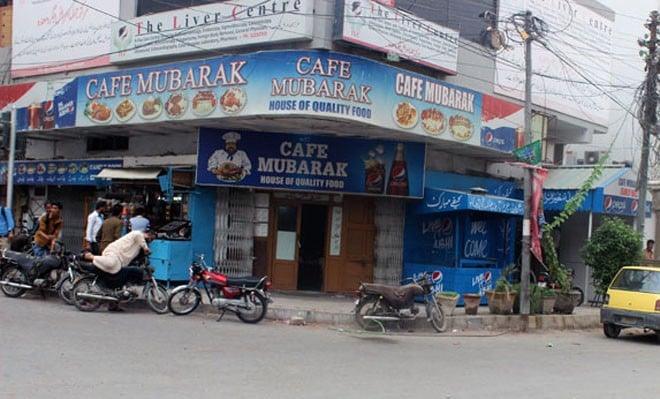
The city’s iconic Iranian restaurants are disappearing fast due to changing customer attitudes, urban sprawl, and even simple economics

The interior of the restaurant is pretty much intact. The effects of age on Café Mubarak are evident but the elegance of the decor is hard to ignore. Time has eaten away the paint, leaving patchy marks, cobwebs have taken over the edges of the high ceiling, but the ancient fans are working fine.
The wooden mahogany furniture -- each set comprising a square table with four chairs -- is spread out evenly across the floor with the signature white cloth below a glass frame. Then there are the waiters, clad in crisp white uniform who acknowledge your presence by serving water from a stainless steel jug with glasses on a tray the moment you occupy one of the chairs.
"It’s a polite way to disrupt a conversation and drive the customer’s attention towards the menu," explains a waiter in Café Mubarak, one of the oldest Iranian restaurants in Karachi. The menu is displayed below the glass frame at the centre of each table.
Iranian restaurants are no more the hip hangout places that they used to be. But they are the remnants of the Karachi of a time when several dozen restaurants, with exotic foods and impeccable service were an indispensable part of the city’s eat-out culture.
In Karachi, these restaurants were owned by Persians who migrated to the coastal city during the British era to seek business opportunities, and ended up introducing some avant-garde ideas which were later adopted by the restaurant industry across the country.
Mohsin Fallah’s family has been running Café Mubarak for more than 50 years. A man in his early 30s, Fallah was born and raised in Karachi. "Before we [Iranian restaurateurs] came in, a lot of things were done differently here," he says."We brought the trend of putting a table cloth and tissue box on each table. The culture of waiters serving in uniform is also something the Persians brought."
Fallah grew up listening to stories of other ethnic restaurants in the city from his uncle, who owned the place. There was an association of restaurant owners in the city and his uncle was one of the members.
"The other restaurateurs e.g. Malbari or Dehliwal, objected to our ways of serving the customers with extra plates, cutlery and tissue-napkins… or bringing sugar separately in a pot while serving tea. They felt these are superfluous exercises and we were unnecessarily soaring up the expectations of customers," he says.
In their prime, the city’s Iranian restaurants used to be the hub of literary get-togethers. As one of Karachi’s top historians, Gul Hassan Kalamati recalls, "it was their décor and the polite waiters that made the Persian restaurants stand out," he says, continuing, "It was quiet and peaceful and the food was delicious and easy on the pocket."
Kalamati says that students, poets, political activists would spend hours in these restaurants, surviving on multiple rounds of tea. Many a political movement, during the 1960s, was planned in these restaurants because they were easily the most popular meeting spots in the city back then.
When introduced for the first time, the typical Iranian food was something exotic for the average Karachiite. "In the 1950s, we were serving prawns with pulao, which was unheard-of in South Asia back then. Then, our recipe of chullo kebab with butter, also got instantly popular," adds Fallah.
For Akhtar Baloch, a renowned blogger on Karachi’s history and culture, Iranian food was popular because it was different -- less spicy and the serving portion was good, and the way it was served made it even more special. "Now a lot of so-called Iranian food joints have deviated from their core traditional food and are selling whatever sells. And many have shut down," he laments.
He deplores the steady disappearance of Iranian food outlets and cites the gradual sprawl of the city as one of the main reasons for the closures. "Karachi is no more restricted to the old city area," says Baloch. "Now, there are so many food outlets selling the same items. It becomes difficult to compete, especially when the Iranian restaurants have a minimum standard to maintain because they earned a name that people rely on."
Kalmati, however, cites the sectarian violence of the 1980s, followed by the "bhatta [extortion] culture" as the tipping point for closure of Iranian restaurants.
"It was the violence that began in the ’80s that forced many Iranians to shut down their businesses."
But, these Iranians were not necessarily Shias.
Most Iranian restaurants were founded by Zoroastrians and Baha’is -- some of the earliest communities to migrate to Karachi. They were always limited in number, but had their shops strategically positioned in the main arteries of the old city; thus, they were popular.
Now, many have sold their businesses or left the country. Hardly 10 such restaurants are functional today.
Fallah sounds pessimistic about the future. "The city has changed," he says. "Now people want to take a long drive and pay double to eat tikka at Do Darya; they don’t come here anymore. They prefer the sea breeze or air-conditioning. I have none!"
But, he has a set of dedicated customers who show up every day -- some old professors and staff from the Institute of Business Administration (IBA) which is next to Café Mubarak, and the senior officers from Pakistan Coast Guard Headquarters which is across the road.
Fallah does not attribute the shutting down of Iranian restaurants to violence in Karachi. Instead, he cites, economics as the chief factor for the gradual fading away of these restaurants. His father is now settled in Iran. Fallah too returned after spending a few years in Iran. When asked if he too plans to leave he says, "You never know."